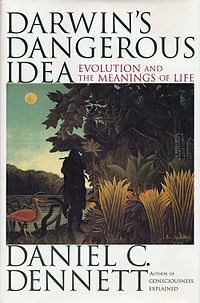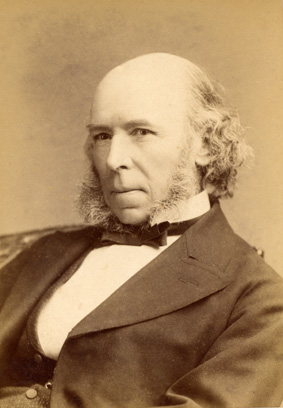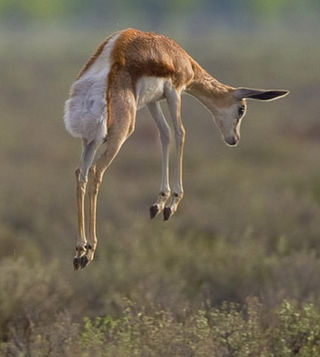
Darwinism is a theory of biological evolution developed by the English naturalist Charles Darwin (1809–1882) and others, stating that all species of organisms arise and develop through the natural selection of small, inherited variations that increase the individual's ability to compete, survive, and reproduce. Also called Darwinian theory, it originally included the broad concepts of transmutation of species or of evolution which gained general scientific acceptance after Darwin published On the Origin of Species in 1859, including concepts which predated Darwin's theories. English biologist Thomas Henry Huxley coined the term Darwinism in April 1860.

Darwin's Dangerous Idea: Evolution and the Meanings of Life is a 1995 book by the philosopher Daniel Dennett, in which the author looks at some of the repercussions of Darwinian theory. The crux of the argument is that, whether or not Darwin's theories are overturned, there is no going back from the dangerous idea that design might not need a designer. Dennett makes this case on the basis that natural selection is a blind process, which is nevertheless sufficiently powerful to explain the evolution of life. Darwin's discovery was that the generation of life worked algorithmically, that processes behind it work in such a way that given these processes the results that they tend toward must be so.

Natural selection is the differential survival and reproduction of individuals due to differences in phenotype. It is a key mechanism of evolution, the change in the heritable traits characteristic of a population over generations. Charles Darwin popularised the term "natural selection", contrasting it with artificial selection, which is intentional, whereas natural selection is not.

Social Darwinism is the study and implementation of various pseudoscientific theories and societal practices that purport to apply biological concepts of natural selection and survival of the fittest to sociology, economics and politics. Social Darwinists believe that the strong should see their wealth and power increase, while the weak should see their wealth and power decrease. Social Darwinist definitions of the strong and the weak vary, and differ on the precise mechanisms that reward strength and punish weakness. Many such views stress competition between individuals in laissez-faire capitalism, while others, emphasizing struggle between national or racial groups, support eugenics, racism, imperialism and/or fascism.

Lamarckism, also known as Lamarckian inheritance or neo-Lamarckism, is the notion that an organism can pass on to its offspring physical characteristics that the parent organism acquired through use or disuse during its lifetime. It is also called the inheritance of acquired characteristics or more recently soft inheritance. The idea is named after the French zoologist Jean-Baptiste Lamarck (1744–1829), who incorporated the classical era theory of soft inheritance into his theory of evolution as a supplement to his concept of orthogenesis, a drive towards complexity.

"Survival of the fittest" is a phrase that originated from Darwinian evolutionary theory as a way of describing the mechanism of natural selection. The biological concept of fitness is defined as reproductive success. In Darwinian terms, the phrase is best understood as "survival of the form that in successive generations will leave most copies of itself."

Orthogenesis, also known as orthogenetic evolution, progressive evolution, evolutionary progress, or progressionism, is an obsolete biological hypothesis that organisms have an innate tendency to evolve in a definite direction towards some goal (teleology) due to some internal mechanism or "driving force". According to the theory, the largest-scale trends in evolution have an absolute goal such as increasing biological complexity. Prominent historical figures who have championed some form of evolutionary progress include Jean-Baptiste Lamarck, Pierre Teilhard de Chardin, and Henri Bergson.
The Transmutation of species and transformism are 18th and early 19th-century ideas about the change of one species into another that preceded Charles Darwin's theory of evolution through natural selection. The French Transformisme was a term used by Jean Baptiste Lamarck in 1809 for his theory, and other 18th and 19th century proponents of pre-Darwinian evolutionary ideas included Denis Diderot, Étienne Geoffroy Saint-Hilaire, Erasmus Darwin, Robert Grant, and Robert Chambers, the anonymous author of the book Vestiges of the Natural History of Creation. Such ideas were associated with 18th century ideas of Deism and human progress. Opposition in the scientific community to these early theories of evolution, led by influential scientists like the anatomists Georges Cuvier and Richard Owen, and the geologist Charles Lyell, was intense. The debate over them was an important stage in the history of evolutionary thought and influenced the subsequent reaction to Darwin's theory.

Islamic views on evolution are diverse, ranging from theistic evolution to Old Earth creationism. Some Muslims around the world believe "humans and other living things have evolved over time", yet some others believe they have "always existed in present form". Some Muslims believe that the processes of life on Earth started from one single point of species with a mixture of water and a viscous clay-like substance. Muslim thinkers have proposed and accepted elements of the theory of evolution, some holding the belief of the supremacy of God in the process. Some scholars suggested that both narratives of creation and of evolution, as understood by modern science, may be believed by modern Muslims as addressing two different kinds of truth, the revealed and the empirical. Others argue that faith and science can be integrated and complement each other.
Devolution, de-evolution, or backward evolution is the notion that species can revert to supposedly more primitive forms over time. The concept relates to the idea that evolution has a divine purpose (teleology) and is thus progressive (orthogenesis), for example that feet might be better than hooves, or lungs than gills. However, evolutionary biology makes no such assumptions, and natural selection shapes adaptations with no foreknowledge or foresights of any kind regarding the outcome. It is possible for small changes to be reversed by chance or selection, but this is no different from the normal course of evolution and as such de-evolution is not compatible with a proper understanding of evolution due to natural selection.
Darwinian literary studies is a branch of literary criticism that studies literature in the context of evolution by means of natural selection, including gene-culture coevolution. It represents an emerging trend of neo-Darwinian thought in intellectual disciplines beyond those traditionally considered as evolutionary biology: evolutionary psychology, evolutionary anthropology, behavioral ecology, evolutionary developmental psychology, cognitive psychology, affective neuroscience, behavioural genetics, evolutionary epistemology, and other such disciplines.
Michael T. Ghiselin was an American biologist and philosopher as well as historian of biology, formerly at the California Academy of Sciences.
Julian Huxley used the phrase "the eclipse of Darwinism" to describe the state of affairs prior to what he called the "modern synthesis". During the "eclipse", evolution was widely accepted in scientific circles but relatively few biologists believed that natural selection was its primary mechanism. Historians of science such as Peter J. Bowler have used the same phrase as a label for the period within the history of evolutionary thought from the 1880s to around 1920, when alternatives to natural selection were developed and explored—as many biologists considered natural selection to have been a wrong guess on Charles Darwin's part, or at least to be of relatively minor importance.
Universal Darwinism, also known as generalized Darwinism, universal selection theory, or Darwinian metaphysics, is a variety of approaches that extend the theory of Darwinism beyond its original domain of biological evolution on Earth. Universal Darwinism aims to formulate a generalized version of the mechanisms of variation, selection and heredity proposed by Charles Darwin, so that they can apply to explain evolution in a wide variety of other domains, including psychology, linguistics, economics, culture, medicine, computer science, and physics.

Evolutionary thought, the recognition that species change over time and the perceived understanding of how such processes work, has roots in antiquity—in the ideas of the ancient Greeks, Romans, Chinese, Church Fathers as well as in medieval Islamic science. With the beginnings of modern biological taxonomy in the late 17th century, two opposed ideas influenced Western biological thinking: essentialism, the belief that every species has essential characteristics that are unalterable, a concept which had developed from medieval Aristotelian metaphysics, and that fit well with natural theology; and the development of the new anti-Aristotelian approach to modern science: as the Enlightenment progressed, evolutionary cosmology and the mechanical philosophy spread from the physical sciences to natural history. Naturalists began to focus on the variability of species; the emergence of palaeontology with the concept of extinction further undermined static views of nature. In the early 19th century prior to Darwinism, Jean-Baptiste Lamarck (1744–1829) proposed his theory of the transmutation of species, the first fully formed theory of evolution.

Teleology in biology is the use of the language of goal-directedness in accounts of evolutionary adaptation, which some biologists and philosophers of science find problematic. The term teleonomy has also been proposed. Before Darwin, organisms were seen as existing because God had designed and created them; their features such as eyes were taken by natural theology to have been made to enable them to carry out their functions, such as seeing. Evolutionary biologists often use similar teleological formulations that invoke purpose, but these imply natural selection rather than actual goals, whether conscious or not. Some biologists and religious thinkers held that evolution itself was somehow goal-directed (orthogenesis), and in vitalist versions, driven by a purposeful life force. With evolution working by natural selection acting on inherited variation, the use of teleology in biology has attracted criticism, and attempts have been made to teach students to avoid teleological language.

Alternatives to Darwinian evolution have been proposed by scholars investigating biology to explain signs of evolution and the relatedness of different groups of living things. The alternatives in question do not deny that evolutionary changes over time are the origin of the diversity of life, nor that the organisms alive today share a common ancestor from the distant past ; rather, they propose alternative mechanisms of evolutionary change over time, arguing against mutations acted on by natural selection as the most important driver of evolutionary change.

Monad to Man: the concept of progress in evolutionary biology is a 1996 book about the longstanding idea that evolution is progressive by the philosopher of biology Michael Ruse. It analyses the connection between ideas of progress in culture generally and its application in evolutionary biology.

"Missing link" is a hypothetical or recently-discovered transitional fossil. It is often used in popular science and in the media for any new transitional form. The term originated to describe the hypothetical intermediate form in the evolutionary series of anthropoid ancestors to anatomically modern humans (hominization). The term was influenced by the pre-Darwinian evolutionary theory of the Great Chain of Being and the now-outdated notion (orthogenesis) that simple organisms are more primitive than complex organisms.

Biology appears in fiction, especially but not only in science fiction, both in the shape of real aspects of the science, used as themes or plot devices, and in the form of fictional elements, whether fictional extensions or applications of biological theory, or through the invention of fictional organisms. Major aspects of biology found in fiction include evolution, disease, genetics, physiology, parasitism and symbiosis (mutualism), ethology, and ecology.
















